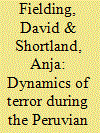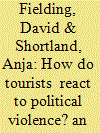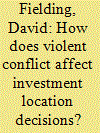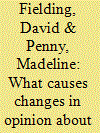| Srl | Item |
| 1 |
ID:
098413


|
|
|
|
|
| Publication |
2010.
|
| Summary/Abstract |
The authors analyse newly collected time-series data measuring the dimensions of violent political conflict in Egypt. Attention is focused on the interaction between politically motivated attacks by Islamists and the counter-insurgency measures used by the Egyptian government. Both insurgency and counter-insurgency are multidimensional. Insurgency includes attacks on tourists, on Egyptian civilians and on security forces. Counter-insurgency includes arrests and attacks on militants. To some extent, the dynamics of insurgency and counter-insurgency can be described by two distinct cycles of violence: one related to highly politicized activities on both sides, and another related to less explicitly political activities. However, the two cycles are inter-related, leading to complex and asymmetric dynamics in the relationships between the different dimensions of the conflict. The authors find that the combination of political repression and military counter-insurgency measures employed by the Egyptian government has the potential to exacerbate rather than reduce political violence. On the other hand, the overall level of conflict intensity in Egypt can be mitigated by food subsidies. Finally, the existence of significant spillovers from upsurges in the Israeli-Palestinian conflict shows the regional importance of reaching a Middle East peace agreement.
|
|
|
|
|
|
|
|
|
|
|
|
|
|
|
|
| 2 |
ID:
117634


|
|
|
|
|
| Publication |
2012.
|
| Summary/Abstract |
The international community has a declared intention to protect civilians from deliberate violence in civil conflicts. The optimal type of foreign intervention and its optimal timing are likely to depend on the combat strategies of the belligerents. Weak belligerents unable to provide economic incentives and security guarantees to civilians often follow a strategy of intimidation and terror. In this case, foreign financial support for one side could affect the strategies of both sides in several different ways, and the interaction between the two sides' strategies could magnify the resulting impact on civilian casualties. Using a new monthly time-series dataset, we explore the factors associated with variations in the intensity of civilian abuse by participants in the guerrilla war in Peru during the 1980s and 1990s. We show that an increase in civilian abuse by one side was strongly associated with subsequent increases in abuse by the other. In this type of war, foreign intervention could substantially reduce the impact on civilians of a sudden rise in conflict intensity, by moderating the resulting 'cycle of violence'. In practice, foreign interventions had a mixed record in Peru: financial support for the Peruvian military raised the level of violence against civilians, but counter-narcotics aid and development aid reduced it. These effects are consistent with a model in which different types of intervention have different effects on belligerents' resource capacity and on the opportunity cost of fighting.
|
|
|
|
|
|
|
|
|
|
|
|
|
|
|
|
| 3 |
ID:
103184


|
|
|
|
|
| Publication |
2011.
|
| Summary/Abstract |
This paper uses a detailed database of political violence in Egypt to study European and US tourists' attitudes towards a conflict region. We study the heterogeneous impacts of different dimensions of political violence and counter-violence on tourist flows to Egypt in the 1990s. Both US and EU tourists respond negatively to attacks on tourists, but are not influenced by casualties arising in confrontations between domestic groups. However, European tourists are sensitive to the counter-violence measures implemented by the Egyptian government. There is also evidence of arrivals of tourists into Egypt rising when fatalities in the Israeli/Palestinian conflict increase.
|
|
|
|
|
|
|
|
|
|
|
|
|
|
|
|
| 4 |
ID:
052899


|
|
|
| 5 |
ID:
085445


|
|
|
|
|
| Publication |
2008.
|
| Summary/Abstract |
In this article, the authors present a statistical analysis of the factors that have driven monthly variations in the aggregate level of support among Israeli Jews for the Oslo Peace Accords since the onset of the intifada. Using data from monthly opinion polls, they find that there is a stable relationship between the fraction of respondents supporting the peace process and variables capturing the current level of conflict intensity. Different dimensions of the conflict have very different effects on Jewish-Israeli public opinion, with substantial heterogeneity in the response of attitudes to conflict events on either side of the Green Line.
|
|
|
|
|
|
|
|
|
|
|
|
|
|
|
|